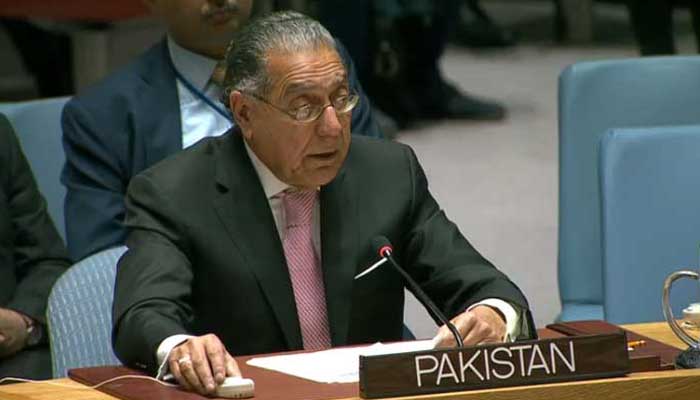Pakistan’s Munir Akram elected as UN ECOSOC's president
Ambassador Akram last served in that capacity in 2005
Pakistan’s Ambassador to the United Nations Munir Akram was on Thursday unanimously elected to head the the Economic and Social Council (ECOSOC), the world body's economic arm, for the term 2020-2021.
Ambassador Akram has been elected as the president of the 54-Member ECOSOC, which is the third principal organ of the UN, along with the General Assembly and Security Council.
Ambassador Akram last served in that capacity in 2005. The only other ambassador to have had this distinction was Juan Somavia of Chile, the former director-general of the International Labour Organization (ILO).
Pakistan has been elected as ECOSOC President six times.
In his acceptance speech, Ambassador Akram, outlining the objectives of Pakistan's residency of the council, said UN Member States face three simultaneous challenges: the coronavirus health and economic crisis, the realisation of the Sustainable Development Goals (SDGs) and the existential threat of climate change.
The commitments made in each area must be implemented, he said.
Quoting the UN Secretary-General, he said, “Inequality defines our times”.
The legacy of colonialism, foreign occupation, and racism is “a major systemic cause of inequality”, among and within nations.
Ambassador Akram hoped that a COVID-19 vaccine will be developed soon.
“Everyone, everywhere — rich or poor — must have equal access to the vaccine”.
He proposed that in the coming year, ECOSOC should focus on three areas — financing of the COVID-19, Sustainable Developement Goals (SDG) and climate change goals; sustainable infrastructure investment; and application of advanced science and technology for development.
Noting that the IMF Managing Director has estimated that developing countries will need over $2.5 billion to recover from the current COVID induced recession, the Pakistani envoy voiced the early call by Prime Minister Imran Khan for a “Global Initiative on Debt Relief”.
Akram mentioned the proposals for new SDRs and other financing proposals under consideration. He said the pledge of the advanced countries to raise 100 billion annually for climate action must be fulfilled.
An additional investment of over $1.5 trillion annually in sustainable infrastructure was “most essential” for the achievement of the SDGs, he added.
He proposed the creation of an Infrastructure Project Preparation and Investment Centre.
The new ECOSOC president called for preferential access for developing countries to advanced technologies and for making the intellectual property regime “compatible with the SDGs”.
The “digital revolution has opened vast opportunities” for the developing countries, not so much to “catch up” with the advanced countries, but to “leapfrog” into a “new and modern development paradigm”.
The ambassador said he would work closely with the incoming President of the General Assembly’s 75th Session, Ambassador Volkan Bozkir of Turkey, who is set to visit Pakistan soon.
ECOSOC was established in 1945 under the UN Charter to promote international economic cooperation and oversee the work of all international economic organisations.
-
Security forces gun down 30 terrorists in multiple IBOs in KP: ISPR
-
MQM-P calls for new province in Sindh
-
US report validates Pakistan military edge over India: PM
-
Banned TTP poses serious threat to Pakistan security: UNSC panel
-
CM Afridi clarifies remarks on by-poll after ECP requests army deployment
-
Dubai sees 3.2m Pakistani passengers in 2025 as airport sets new milestone
-
Security forces kill 23 Indian proxy terrorists in KP's Kurram
-
Pakistan to construct island to boost oil exploration: report












